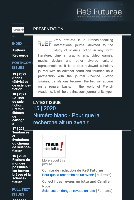
ReS Futurae-Revue d Etudes sur la Science-Fiction
Scope & Guideline
Decoding the Future: Where Imagination Meets Academia
Introduction
Aims and Scopes
- Interdisciplinary Approaches to Science Fiction:
The journal promotes interdisciplinary research, integrating perspectives from literature, cultural studies, education, and sociology to analyze science fiction's impact and significance. - Educational Applications of Science Fiction:
A core focus is on the educational potential of science fiction, exploring how these narratives can be utilized in teaching and learning across different levels of education. - Cultural and Political Critique:
Contributions often engage with science fiction as a medium for cultural critique, examining themes such as feminism, posthumanism, climate change, and socio-political dynamics. - Historical Contextualization:
The journal also emphasizes the historical evolution of science fiction, tracing its roots and developments through various periods and cultural movements. - Theoretical Exploration:
Theoretical discussions, particularly concerning narrative structures, genre definitions, and the role of science fiction in shaping societal narratives, are central to the journal's contributions.
Trending and Emerging
- Climate Fiction (Cli-fi):
There is an increasing emphasis on climate fiction, exploring how speculative narratives address environmental issues, reflecting growing global concerns about climate change and its societal implications. - Posthumanism and Feminism:
Recent publications highlight a strong interest in posthumanist and feminist readings of science fiction, analyzing how these perspectives reshape our understanding of identity, agency, and power in speculative contexts. - Educational Innovations:
A notable trend is the exploration of innovative educational practices using science fiction, particularly in integrating virtual reality and design fiction into arts education, which may enhance critical thinking and engagement. - Intermedial Studies:
Emerging research focuses on intermediality, examining how science fiction transcends traditional boundaries between literature, film, and other media, reflecting the hybrid nature of contemporary storytelling. - Cultural Critique and Socio-political Engagement:
Increasingly, articles engage with science fiction as a tool for cultural critique, addressing contemporary issues such as immigration, identity, and socio-political dynamics, thereby reinforcing the genre's relevance to current societal debates.
Declining or Waning
- Traditional Genre Definitions:
There has been a noticeable decline in discussions centered around rigid definitions of science fiction as a genre. This reflects a broader acceptance of genre fluidity and the blending of science fiction with other literary forms. - Historical Focus on Early Science Fiction:
While historical analyses of early science fiction were once prevalent, recent publications suggest a waning interest in this area, possibly as scholars shift towards contemporary and future-oriented narratives. - Narrow Thematic Studies:
The journal appears to be moving away from narrow thematic studies focused solely on specific works or authors, indicating a broader, more integrative approach in recent publications.
Similar Journals
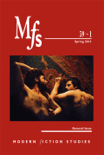
MFS-Modern Fiction Studies
Illuminating the Future of Fiction StudiesMFS-Modern Fiction Studies is a premier journal in the field of literature and literary theory, published by Johns Hopkins University Press. With an impressive impact factor and a 2023 classification in Q1, this journal stands out as a vital resource for scholars, researchers, and practitioners interested in contemporary fiction analysis and criticism. The journal aims to foster innovative scholarship, enhance discussions around literary trends, and explore the intricacies of modern narrative forms. Notably, it ranks #119 among 1,106 in the Scopus Arts and Humanities category, placing it within the top 89th percentile. Published four times a year, MFS is committed to making significant contributions to the understanding of modern fiction, making it a must-read for anyone vested in the evolution of literature. Access options are available through institutional subscriptions, ensuring that readers can engage with cutting-edge research and discourse in the literary community.

CRITIQUE
Fostering Critical Discourse Across Disciplines.CRITIQUE is a prominent French academic journal published by EDITIONS MINUIT, specializing in the fields of cultural studies, history, and literary theory. Since its inception, CRITIQUE has provided a critical platform for scholarly discourse, aiming to challenge conventional perspectives and foster innovative thought within the humanities. While it operates under a traditional subscription model, its commitment to intellectual rigor positions it as a valuable resource for researchers, students, and professionals alike. With a focus on interdisciplinary approaches and critical methodologies, CRITIQUE holds its place among the esteemed ranks of cultural studies and literary publications, currently rated in Q4 across various categories by Scopus. As it converges through the years from 2015 to 2024, the journal continues to facilitate discussions that interrogate historical narratives and their cultural contexts, making it an essential read for anyone invested in the developments of contemporary thought in the humanities.
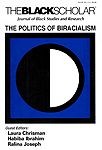
BLACK SCHOLAR
Engaging with the Rich Tapestry of Black ThoughtBLACK SCHOLAR is a distinguished journal that has been a vital forum for critical thought and discourse since its inception in 1969. Published by Routledge Journals, Taylor & Francis Ltd in the United Kingdom, this journal aims to explore the complexities of Black identity and the socio-political dynamics that permeate this field. With an ISSN of 0006-4246 and E-ISSN of 2162-5387, it is well-positioned within major academic databases, contributing to a rich dialogue in the domains of Arts and Humanities, Cultural Studies, and Sociology. Holding a Q3 classification in Arts and Humanities and Cultural Studies, as well as a Q4 ranking in Sociology and Political Science, BLACK SCHOLAR is recognized for its impactful contributions, despite operating under a traditional publishing model. By fostering interdisciplinary research and shedding light on critical issues, this journal serves as an essential resource for researchers, professionals, and students seeking to deepen their understanding of Black experiences and narratives.
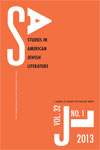
Studies in American Jewish Literature
Celebrating the Legacy of Jewish Literary ContributionsStudies in American Jewish Literature, published by Penn State University Press, is a premier academic journal that delves into the rich tapestry of Jewish literary expression in America. With an ISSN of 0271-9274 and an E-ISSN of 1948-5077, this journal serves a vital role in the fields of Literature and Literary Theory, Cultural Studies, and Anthropology, as evidenced by its placement in the Q1 to Q3 quartiles across various categories in 2023. The journal is a key platform for researchers, professionals, and students interested in exploring the intersection of Jewish identity and American literature, contributing to a deeper understanding of cultural narratives and societal impacts. The publisher's commitment to scholarly excellence ensures that each issue is meticulously curated, showcasing innovative research and critical analysis. While not open access, the journal provides essential insights for anyone engaged in the study of Jewish literature or the broader cultural dynamics at play in American society. Stay informed on contemporary themes and historical contexts that shape literary discourse through this commendable publication.

MERKUR-DEUTSCHE ZEITSCHRIFT FUR EUROPAISCHES DENKEN
Reflecting on the Dynamics of European ThoughtMERKUR-DEUTSCHE ZEITSCHRIFT FUR EUROPAISCHES DENKEN is a prestigious journal published by Klett-Cotta Verlag, dedicated to the exploration of European thought, culture, and intellectual discourse. With an ISSN of 0026-0096, this journal provides a platform for critical analysis and reflection on a wide array of topics within the fields of Arts and Humanities, Cultural Studies, and Sociology. Although coverage in Scopus was discontinued in 2014, MERKUR maintains a significant historical footprint, having previously ranked #76 in Arts and Humanities and #519 in Cultural Studies. This underscores its role in contributing to scholarly conversations regarding European intellectual traditions. The journal, located at Rotebühlstraße 77, D-7004 9 Stuttgart 1, Germany, while not open access, remains an essential resource for researchers, professionals, and students alike, keen on examining the contours of European thinking and its implications in contemporary society.

Tydskrif vir letterkunde
Unlocking New Perspectives in Literary DiscourseTydskrif vir letterkunde is an esteemed open-access journal published by UNIV PRETORIA, dedicated to the exploration and discourse surrounding literature and cultural studies in the South African context and beyond. With an impressive Q1 ranking in Literature and Literary Theory and a Q2 ranking in Cultural Studies as of 2023, this journal serves as a vital platform for researchers, professionals, and students alike, aiming to bridge theoretical concepts with contemporary literary practices. Since becoming open access in 2015, it has broadened its reach, allowing for greater collaboration and knowledge dissemination within the global academic community. By welcoming diverse voices and innovative research, Tydskrif vir letterkunde not only contributes to the rich tapestry of literary scholarship but also fosters critical dialogue around cultural issues, ensuring its relevance in an ever-evolving field.

Acta Literaria
Cultivating Insightful Analyses of Literary WorksActa Literaria is a distinguished journal published by the Universidad de Concepción, Facultad de Humanidades y Arte, focusing on the intricate domains of literature and literary theory. With an ISSN of 0717-6848, this Chilean journal has been a vital contributor to the scholarly discourse in its field since its inception in 2007. Although currently categorized in the Q4 quartile for the year 2023 and holding a Scopus rank of #860 out of 1106 in the Arts and Humanities section, Acta Literaria plays a crucial role in fostering dialogue and exploration among researchers, professionals, and students alike. The journal aims to facilitate the exchange of innovative ideas, critical analyses, and diverse perspectives on literature, making it an indispensable resource for anyone engaged in literary studies. While it does not offer open access, the journal's commitment to upholding academic rigor ensures that it remains a respected platform for scholarly publication.
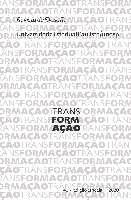
Trans-Form-Acao
Cultivating Scholarly Excellence in the HumanitiesTrans-Form-Acao is a prominent Open Access journal published by UNESP-MARILIA, dedicated to the field of Philosophy. Since its inception in 1974, the journal has fostered a vibrant academic discourse within the humanities, encouraging scholars to share innovative ideas and critical analyses. With an ISSN of 0101-3173 and an E-ISSN of 1980-539X, it has gained significant recognition in Scopus, ranking #285 out of 806 in the Arts and Humanities category, placing it in the 64th percentile for philosophy journals (2023). The journal's commitment to accessibility and rigorous scholarship has positioned it within the Q3 quartile, reflecting its growing influence and esteem in philosophical studies. Scholarly contributions are welcome across a range of philosophical topics, making it an essential resource for researchers, professionals, and students alike who seek to engage with contemporary philosophical thought. For further details, please refer to their address at AV HYGINO MUZZI FILHO, 737, MARILIA, SP 17525-900, BRAZIL.

Scandia is a distinguished academic journal dedicated to the field of history, published by SCANDIA in Sweden. With its origins dating back to 1976, the journal offers a platform for scholarly discourse, focusing on various historical perspectives and methodologies. Although currently not recognized as an Open Access journal, it fosters a rich exchange of ideas and original research, appealing to historians, researchers, and students alike. Operating within the Q4 quartile of its category for 2023, Scandia holds a significant position in the history landscape, ranking at #1627 out of 1760 in Scopus, representing the 7th percentile. With a commitment to quality scholarship, Scandia encourages contributions that challenge existing narratives and contribute to the broader understanding of historical contexts.
Please send your submissions or inquiries to the editorial office at Historiska Inst, Box 2074, Lund 220 02, Sweden.
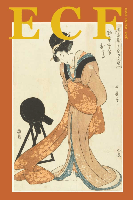
Eighteenth-Century Fiction
Engaging Scholars in the Legacy of Eighteenth-Century FictionEighteenth-Century Fiction is a premier academic journal dedicated to advancing the study of literature from the eighteenth century, publishing innovative research that contributes to understanding the cultural and historical contexts of this dynamic period. Published by University of Toronto Press, Inc., this journal boasts an impressive Q1 categorization in the field of Literature and Literary Theory, reflecting its significant impact on discourse among scholars. Since its inception in 2002, the journal has provided a platform for interdisciplinary exploration and critical analysis, appealing to researchers, professionals, and students alike. With an ongoing commitment to quality and scholarly excellence, Eighteenth-Century Fiction serves as an essential resource for those seeking to delve into the literary innovations and societal transformations of the eighteenth century. Access to its rich collection of articles ensures that the academic community remains engaged with emerging trends and pivotal research in this vital area of study.